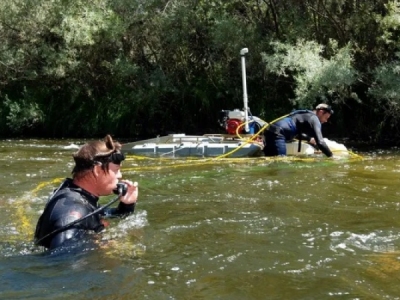
Posted on February 12, 2019
Oregon’s suction dredge miners, recently banned from gold mining in salmon-bearing streams, are taking a new tack.
They’ve formed a nonprofit, called StreamSavers, and are asking the Legislature to fund stream cleanup projects using their dredge equipment.
The miners say that, in addition to bringing up gold and other valuable minerals from stream bottoms, their dredge equipment uncovers old fishing lures, lead shot and trash, much of which is toxic.
“Our waterway cleaning process will actually assist nature in returning itself to what it was meant to be, a clean, pristine, refreshing water source without pollution,” the nonprofit organization’s web site reads. “StreamSavers are trained and experienced technicians with a deep concern for aquatic health that will last for generations to come.”
A House committee will hold a public hearing on the proposal, House Bill 2737, Tuesday afternoon.
If passed, the bill would divert half of the fines the Department of Environmental Quality collects each year for water quality violations into a new Waterway Enhancement Fund, which would provide grants for removing debris in waterways.
DEQ officials were unable to say what that money — averaging about $400,000 per year — is currently spent on.
“Penalties don’t fund DEQ programs,” spokeswoman Jennifer Flynt said.
The bill doesn’t specifically name StreamSavers. But the group’s Facebook page calls it “our funding bill,” and urges members to testify and write letters of support.
No one at StreamSavers, which is based in Hubbard, could be reached for comment.
Environmental impact debated
Suction dredge mining, or placer mining, involves vacuuming riverbeds through a hose, using a motorized floating dredge. Supporters say it is harmless when done properly.
Opponents say it can increase turbidity by stirring up mercury deposits, trapping and killing aquatic insects, fish eggs and juvenile fish. They also say it creates noise that bothers other river users.
“The idea that’s beneficial for salmon is crazy to me,” said Steve Pedery, conservation director for Oregon Wild.
“Dredging is considered point source pollution and that needs to be regulated,” Flynt said.
California put a moratorium on suction dredge mining in 2009. Following that ban, large numbers of suction dredge miners moved to the rivers of Southern Oregon.
In response, the Oregon Legislature passed a bill in 2013 imposing a five-year moratorium, beginning in 2016, on motorized mining for precious metals in streams and upland of rivers and tributaries with essential indigenous salmon habitat.
Idaho also cracked down on suction dredge mining in 2013.
StreamSavers was founded later that year.
In October 2015, three months before the moratorium was to take effect, a dozen miners and mining associations filed a lawsuit, arguing state regulation of their mining claims was preempted by federal law.
A district court ruled in favor of the state, but the miners appealed. In September 2018, the 9th Circuit Court of Appeals affirmed the state’s right to regulate mining methods.
Compromise bill passed in 2017
In 2017, after working for years to find a compromise between protecting salmon and steelhead and supporting the hobby miners, many of whom have spent thousands of dollars on their equipment, the Oregon Legislature passed SB 3.
It kept a permanent ban in place in rivers containing essential indigenous salmonid habitat, but opened other areas as long as operators get a permit from DEQ. The permits limit operating hours.
“Oregon went through a bruising legislative battle over this issue,” Pedery said.
“At the time, these guys were arguing that it would be fine for them to run these dredges in essential fish habitat because they were doing something actually beneficial for salmon and trout,” he said. “It didn’t pass the laugh test then and it doesn’t now.”
The number of miners holding permits has dropped from 156 before SB 3 passed to 59 today, DEQ data show.
Rep. Mike Nearman, R-Independence, is sponsoring the new stream-cleanup grant proposal.
Nearman and Rep. Fred Girod, R-Stayton, also are sponsoring other bills to change suction dredge mining rules.
Both HB 2739 and SB 633 would create an exemption from the ban in salmonid habitat for dredge mining equipment that uses recirculating water systems.
HB 2738 and SB 632 both would modify intake conditions for motorized suction dredges. Currently dredges cannot have a suction hose with a diameter exceeding four inches. The bill would change that to a nozzle bigger than four inches.
Neither Nearman nor Girod responded to interview requests.
Source: statesmanjournal





